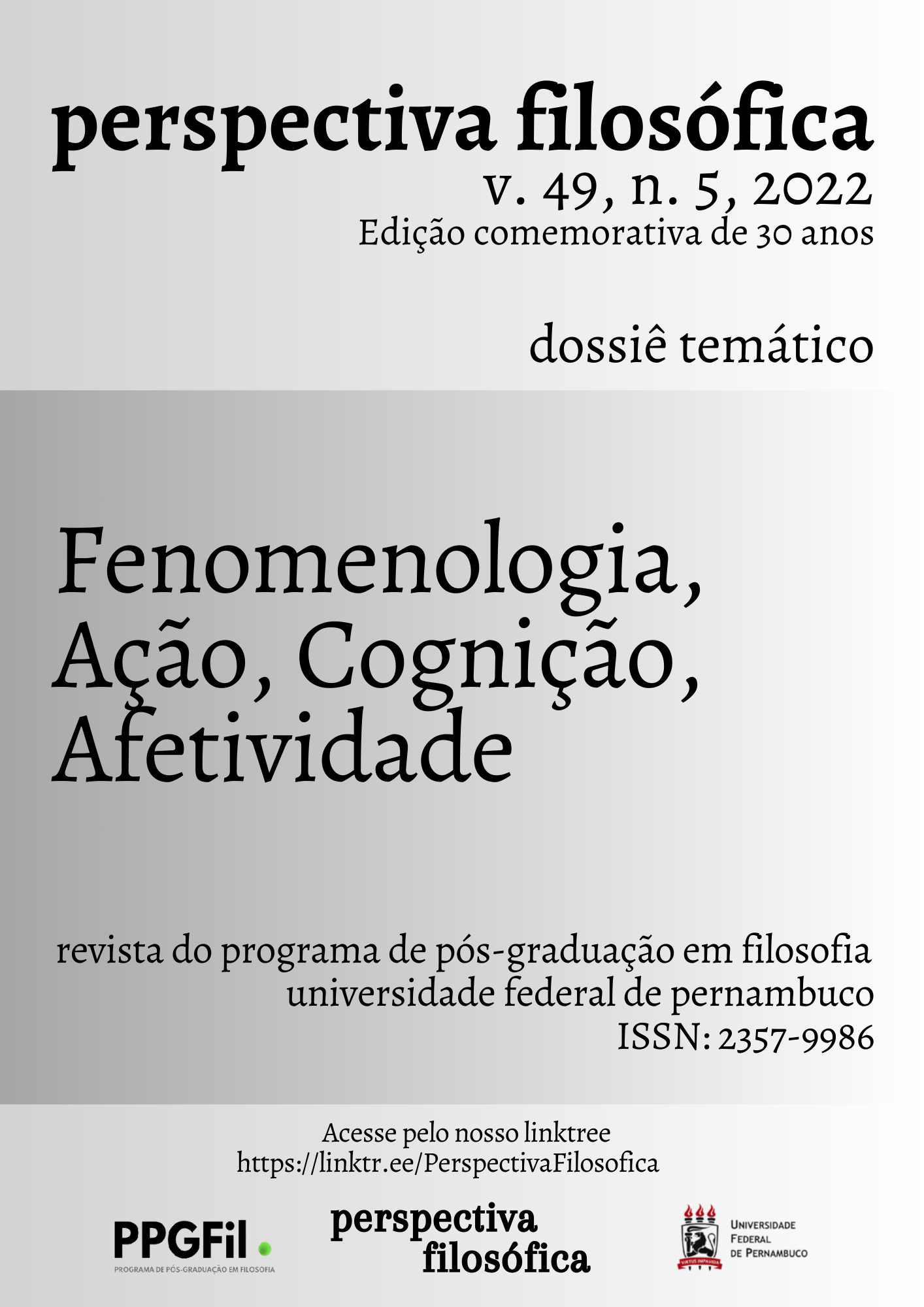Enativism and moral pschology: learning (together) to be people
DOI:
https://doi.org/10.51359/2357-9986.2022.256761Keywords:
enactivism, moral psychology, habits, human becoming, ethical dimension of experienceAbstract
In this paper I present the enactive approach and a review of the enactive li-terature that aims to give contributions to ethical thought. I show how wefind in the enactive approach a moral psychology that is against universalis-tic moral perspectives. By moral psychology I mean a robust understandingof the human mind, what it is and its development, as it is relevant to morallife. By universalistic moral perspectives, I want to refer to theories that takemoral questions to be fundamentally about moral choices, henceforth, thatmoral philosophy must be oriented around discussions of which principlesmust (universally) guide our chosen actions. After presenting the enactiveimage of human moral psychology, we will see that it needs to be supple-mented by an account of what constitutes the ethical dimension of experience.References
Barandiaran, Xabier E., e Ezequiel A. Di Paolo. 2014. “A genealogical map of the concept of habit”. Frontiers in Human Neuroscience 8: 522. https://doi.org/10.3389/fnhum.2014.00522.
Colombetti, Giovanna, e Steve Torrance. 2009. “Emotion and Ethics: An Inter-(En)Active Approach”. Phenomenology and the Cognitive Sciences 8 (4): 505–26. https://doi.org/10.1007/s11097-009-9137-3.
De Jaegher, Hanne. 2019. “Loving and Knowing: Reflections for an Engaged Epistemology”. Phenomenology and the Cognitive Sciences, agosto. https://doi.org/10.1007/s11097-019-09634-5.
De Jaegher, Hanne, e Ezequiel Di Paolo. 2007. “Participatory Sense-Making: An Enactive Approach to Social Cognition”. Phenomenology and the Cognitive Sciences 6 (4): 485–507. https://doi.org/10.1007/s11097-007-9076-9.
De Jaegher, Hanne, Ezequiel Di Paolo, e Shaun Gallagher. 2010. “Can Social Interaction Constitute Social Cognition?” Trends in Cognitive Sciences 14 (10): 441–47. https://doi.org/10.1016/j.tics.2010.06.009.
Di Paolo, Ezequiel A. 2020. “Enactive Becoming”. Phenomenology and the Cognitive Sciences, janeiro. https://doi.org/10.1007/s11097-019-09654-1.
Di Paolo, Ezequiel A., Thomas Buhrmann, e Xabier E. Barandiaran. 2017. Sensorimotor life: an enactive proposal. First edition. Oxford, United Kingdom: Oxford University Press.
Di Paolo, Ezequiel A., Elena Clare Cuffari, e Hanne De Jaegher. 2018. Linguistic Bodies: The Continuity between Life and Language. Cambridge, Massachusetts: The MIT Press.
Di Paolo, Ezequiel A., e Hanne De Jaegher. 2021. “Enactive Ethics: Difference Becoming Participation”. Topoi, outubro. https://doi.org/10.1007/s11245-021-09766-x.
Diamond, Cora. 2019. “Iris Murdoch’s Picture of the Soul”. Opinion. ABC Religion & Ethics. Australian Broadcasting Corporation. 17 de julho de 2019. https://www.abc.net.au/religion/cora-diamond-picture-of-the-soul-the-moral-psychology-of-iris-m/11316086.
Figueiredo, Nara M. 2021. “On the Notion of Dialectics in the Linguistic Bodies Theory”. Filosofia Unisinos 22 (1): 108–16. https://doi.org/10.4013/fsu.2021.221.13.
Godfrey-Smith, Peter. 2020. Metazoa: Animal Life and the Birth of the Mind. Farrar, Straus and Giroux.
Huffermann, J. D. (2019). “Variedades do Enativismo: Propostas radicais e cognição superior”. Revista Perspectiva Filosófica - ISSN: 2357-9986, 46(2), Article 2. https://doi.org/10.51359/2357-9986.2019.248072.
Huffermann, J. D., & Noguez, P. M. R. (2020). Propostas Enativas e a questão da continuidade entre formas de cognição. Prometheus - Journal of Philosophy, 33, Article 33. https://doi.org/10.52052/issn.2176-5960.pro.v12i33.13814.
Husserl, Edmmund. 1952. Ideen zu einer Reinen Phänomenologie Und Phänomenologischen Philosophie II. Nijhoff: Den Haag.
Hutto, Daniel D., e Erik Myin. 2013. Radicalizing Enactivism: Basic Minds without Content. Cambridge, Mass: MIT Press.
Hutto, Daniel D., e Erik Myin. 2017. Evolving Enactivism: Basic Minds Meet Content. Cambridge, Massachusetts: MIT Press.
Johnson, Mark. 2014. Morality for Humans: Ethical Understanding from the Perspective of Cognitive Science. University of Chicago Press. https://doi.org/10.7208/chicago/9780226113548.001.0001.
Laland, K. N., Odling-Smee, J., & Feldman, M. W. (2000). “Niche construction, biological evolution, and cultural change”. Behavioral and Brain Sciences, 23(1), 131–146. https://doi.org/10.1017/S0140525X00002417.
Maclaren, Kym. 2002. “Intercorporeality, Intersubjectivity and the problem of ‘letting others be’.” Chiasmi International: Trilingual Studies Concerning Merleau-Ponty’s Thought 4: 187–210.
Murdoch, Iris. 2013. The Sovereignty of Good. 2° ed. First Published in 1970. New York: Routledge, Taylor & Francis Group.
Raimondi, V. (2021). “Autopoiesis and evolution: The role of organisms in natural drift”. Adaptive Behavior, 10597123211030694. https://doi.org/10.1177/10597123211030694.
Reis, C. R. M. dos, & Araújo, L. A. L. (2019). “A natureza das mudanças na biologia evolutiva contemporânea: Síntese Evolutiva Estendida?” Revista Dissertatio de Filosofia, 50(0), 133–150. https://doi.org/10.15210/dissertatio.v50i0.14566.
Rolla, G. (2021). A Mente Enativa. Porto Alegre: Editora Fi https://doi.org/10.22350/9786559173341.
Rolla, G., & Figueiredo, N. (2021). “Bringing forth a world, literally”. Phenomenology and the Cognitive Sciences. https://doi.org/10.1007/s11097-021-09760-z.
Rolla, G., & Huffermann, J. (2021). “Converging enactivisms: Radical enactivism meets linguistic bodies”. Adaptive Behavior, 105971232110207. https://doi.org/10.1177/10597123211020782.
Taylor, Charles. 1986. Sources of the Self: The Making of the Modern Identity. Cambridge: Harvard University Press.
Thompson, Evan. 2004. “Life and Mind: From Autopoiesis to Neurophenomenology. A Tribute to Francisco Varela”. Phenomenology and the Cognitive Sciences 3 (4): 381–98. https://doi.org/10.1023/B:PHEN.0000048936.73339.dd.
Thompson, Evan. 2007. Mind in Life: Biology, Phenomenology, and the Sciences of Mind. Cambridge, Mass: Belknap Press of Harvard University Press.
Thompson, Evan, e Francisco J. Varela. 2001. “Radical Embodiment: Neural Dynamics and Consciousness”. Trends in Cognitive Sciences 5 (10): 418–25. https://doi.org/10.1016/s1364-6613(00)01750-2.
Tomasello, Michael. 2014. A Natural History of Human Thinking. Cambridge, Massachusetts. London, England: Harvard University Press.
Urban, Petr. 2014. “Toward an Expansion of an Enactive Ethics with the Help of Care Ethics”. Frontiers in Psychology 5 (novembro). https://doi.org/10.3389/fpsyg.2014.01354.
Varela, Francisco J. 1999. Ethical Know-How: Action, Wisdom, and Cognition. Stanford, California: Stanford University Press.
Varela, Francisco J, Evan Thompson, e Eleanor Rosch. 1991. “Embodied Mind. Cognitive Science and Human Experience”, 328.
Ward, Dave, David Silverman, e Mario Villalobos. 2017. “Introduction: The Varieties of Enactivism”. Topoi 36 (3): 365–75. https://doi.org/10.1007/s11245-017-9484-6.
Werner, K. (2020). “Enactment and construction of the cognitive niche: Toward an ontology of the mind-world connection”. Synthese, 197(3), 1313–1341. https://doi.org/10.1007/s11229-018-1756-1.
Downloads
Published
Issue
Section
License
A Revista Perspectiva Filosófica orienta seus procedimentos de gestão de artigos conforme as diretrizes básicas formuladas pelo Conselho Nacional de Desenvolvimento Científico e Tecnológico (CNPq). http://www.cnpq.br/web/guest/diretrizesAutores que publicam nesta revista concordam com os seguintes termos:
Os autores mantém os direitos autorais e concedem à revista o direito de primeira publicação, sendo o trabalho simultaneamente licenciado sob https://creativecommons.org/licenses/by/4.0/deed.pt_BR que permite o compartilhamento do trabalho com reconhecimento da autoria e publicação inicial nesta revista.
Os autores têm autorização para assumir contratos adicionais separadamente, para distribuição não-exclusiva da versão do trabalho publicada nesta revista, com reconhecimento de autoria e publicação inicial nesta revista (Consultar http://opcit.eprints.org/oacitation-biblio.html).

Esta revista está licenciada com uma Licença Creative Commons Atribuição 4.0 Internacional.













